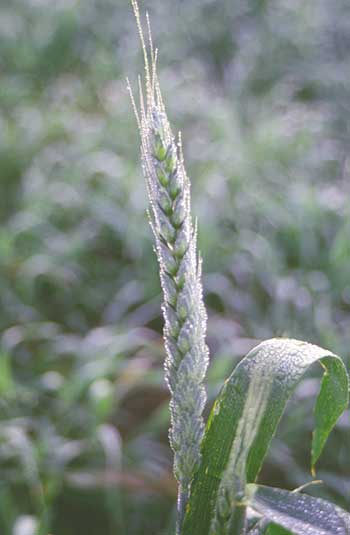A 9.3 million co-investment supported by GRDC, will work to determine the definitive impacts of frost and heat risk on grains crops and develop tangible, commercial products that growers can use to mitigate risk.
The project, ‘Frost and Heat Management Analytics’, which was launched in partnership with Australia’s leading science agency, CSIRO, will use both existing data and new research to gain a more precise understanding of how heat and frost events impact crops and how to mitigate risk prior to and during a growing season.
GRDC Senior Manager Enabling Technologies Tom Giles says yield loss from frost and heat events in wheat alone is estimated to cost Australian grain growers more than $500m annually, which is why GRDC has invested $6.2 million into this research to help growers better respond to damaging weather events.
“Responding to heat and frost stress will require both genetic solutions and change to farm management practices. This research will aid growers implement change and make informed management decisions to maintain productivity despite frost and heat risk,” he says.
“We developed this investment in a way that ensured it involved the commercial sector from the beginning so the end result would deliver tangible, usable products for growers to improve their production.”
CSIRO crop scientist Julianne Lilley, who will co-lead the research project, says the investment is exciting for the grains industry because it will address a current gap in understanding the full implications and potential yield loss of frost and heat events.
“What we’re aiming to do is collate data to improve crop modelling and better understand the yield damage of frost and heat risk and improve the ability to predict these events,” Dr Lilley says.
“The project will bring together the science of temperature mapping and the damage of crops that occur during frost and heat stress and we’ll be able to integrate the data across broad, spatial scales.”
Fellow co-leader and CSIRO research scientist, David Deery, says data collected and analysed from the project will allow growers to make more informed planting decisions prior to the season, including when to sow, what to sow and where to sow to help mitigate climate risk.
“It will help with big decisions during the season too. If they are impacted by a mid-season frost event or heat stress, they will be able to use the data to make an economically informed decision on whether they turn to hay production, graze the crop or follow it through to harvest,” Dr Deery says.
“We think the data could also be used to develop new site-specific frost and heat insurance options and would aid in insurance assessments.”
A key element of the research project is to ensure the end data and research can be used to develop tangible, commercial products that growers can use on farm to help them mitigate risk and make more informed decisions to avoid yield loss from frost and heat stress.
 Frost and heat events cost Australian grain growers $500 million annually in wheat alone. This investment aims to reduce this impact.
Frost and heat events cost Australian grain growers $500 million annually in wheat alone. This investment aims to reduce this impact.
Dr Deery says the project has been collaborative since its inception, giving farm advisory organisations and agtech companies a seat at the table to ensure end products meet growers’ needs.
“We’ll provide the data from the project so the commercial companies can use it to develop fit for -purpose tools that growers can actually use,” he says.
“Engagement with growers is what will underpin the design of the tools - which is why an engagement company is currently interviewing growers to understand the challenges they are facing with frost and heat stress and what tools could help them manage it.
“We wanted the agtech companies and grower advisers to be there at the beginning of the project to ensure any products developed from the data are grower focused and will be tangible to use on Australian farms.
“In a way, we are thinking about how the end products could be most effective first, then we will go back and develop the science to support them.
Mr Giles says GRDC’s extensive investment into projects like this show the organisation’s commitment to helping growers navigate climate variability.
“GRDC is a great supporter of innovation and aims to deliver more impact to grower profitability through investing in targeted research and supporting ag-tech innovation,” he says.
“What’s especially exciting about this project is seeing different pieces of a puzzle come together – for example, the project will use the gene-driven models developed through another investment, the National Phenology Initiative (NPI), to generate the variety-specific flowering time data needed to improve the APSIM modelling.
“This linkage between the NPI and this new frost and heat project is a great testament to the value of playing the long game with digital ag.
“By chasing the high-value areas that take time, investment, and resilience to crack, GRDC is now in a position to create impact like never before in digital ag with new projects like this.”
The project will be completed across four years, ending in 2026, however Dr Lilley says outcomes for crops with substantial, existing data could be expected by 2024.
“Because there’s a lot of existing data for wheat, barley and canola we aim to develop outcomes for these crops within a two-year timeframe but with crops like chickpeas and lentils, where there’s been less research and investment prior to now, outcomes will take longer,” she says.
“We plan to use a lot of existing data to determine damage factors. We will most likely identify gaps that will require further research, but we anticipate we’ll be able to significantly progress outcomes with existing data.”
The project partners include: Lead agency CSIRO, Eratos, Square V, Hillridge, Pairtree Intelligence, Agworld, Data Farming, Elders, Delta Agribusiness, Birchip Cropping Group, Grower Group Alliance, NSW DPI, SARDI, DPIRD, CSU, UQ (QAFFI).

























































